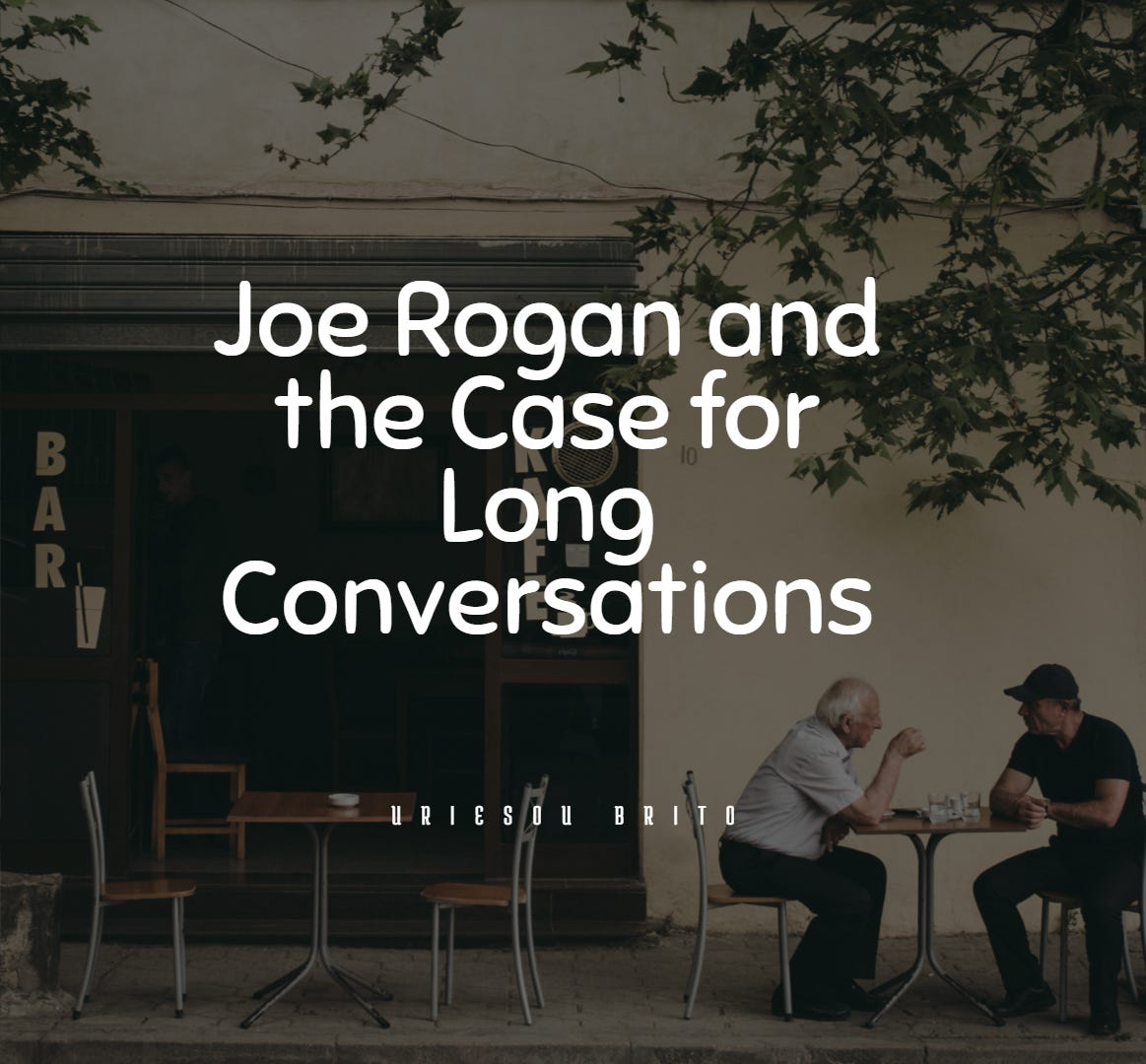Joe Rogan and the Case for Long Conversations

These last few days have been filled with long conversations with dear friends. I treasure them and their words with my heart. On one evening, we delved into each other’s lives and history; on another evening, we spent time dissecting the glories and agonies of life; and the other night, we sat around good food and delved–again–deep into our histories and who the shaping figures are in our lives. Even though parents speak in fragments to one another, I trust even those incomplete sentences–interrupted seven or eight times by the needs of four-year-olds–bore good fruit.
This is all a tribute to good conversation; the kind that leaves an imprint on the next day, and the next day. I am the kind of romantic who believes discipleship happens like that; through long conversations in the right direction. Some intimate, some intriguing, but always stimulating. There are people, and then there are people who are curious. The latter make good friends. These friendships are enriched by resurrection meals around a fire in good and in bad times.
One of the blessings I’ve had over the years is to speak freely about a host of issues that few pastors wish to discuss on social media, unless, of course, they take upon themselves anonymous identities. I met with a pastor a few months ago who wondered if I get a lot of “hate” from readers for the things I say. I was genuinely puzzled by his words. I simply take it as an exercise in written dialogue with others. Yes, some don’t like this or that, but I will take that rather than this sentiment.
I am part of a denomination that rarely if ever makes the map when it comes to national discourse. Our pastors are not well known; with few exceptions, they don’t make headlines, and when we do, it’s to engage in intramural discussions that 0.001% of evangelicals care to ponder and the other times, we find ourselves as the amusement of leftists.
I actually find this lack of exposure fairly comforting. It means that I, as a pastor of a growing congregation, have the luxury of opining about a host of topics I find to be biblically important, culturally necessary, and pastorally expedient without distractions. This allows me to minister to a small group of people that are interested in growth and find arguments built in lengthy paragraphs compelling.
In some ways, my goal of writing has always been to slowly, but surely, convince my readers that building frameworks for life are important, and thinking about current issues or rituals through a Christian perspective is crucial for the well-being of any society. I am still a believer in long-form conversation and dialogue about the good, true and beautiful, and I view it as an investment in the kingdom of God.
I had a lengthy interview/conversation with a really fine thinker yesterday that reminded me of the necessity of building men and women who love Jesus and are curious enough to create environments where a healthy engagement takes place in the home and in the community; where discourse is not settled by throwing out slogans, but where the heart of the slogan is discussed and perhaps torn down. The long conversations I had with friends these last few days are a testament to the necessity of good stories and hearty gatherings. More of these thoughts need fleshing out. Communities thrive in conversation together.
While we see some movement in the right direction, we need much more. I am reminded of one of Jordan Peterson’s rules which I translate as “Don’t raise children with whom you won’t converse.” In other words, don’t raise children that will bore you when they get older. You diminish that possibility if everything is on the table for discussion at the dinner table and if the children are a part of these long conversations.
The entire Joe Rogan brouhaha ultimately is the leftist attempt to derail long-form conversation. Leftists are afraid of lengthy engagement. Long-form interactions open us to say things sometimes we regret, but if conversations continue, it opens us to correct bad ways of thinking and repent for thinking badly. Rogan is doing–as an unbeliever–what many Christians fail to do because they have no interest in being framed and formed by others. They despise accountability and they despise the ritual of a long talk.
The biggest frustration of this entire season is that prior to it there was already a deficit in these conversations, and through it, many discovered that they don’t need it anymore thus isolating themselves with greater vigor and enthusiasm. The isolating process diminished, even more, the capacity for discussing complex topics. Movements are throwing out their acronyms and demanding loyalty simply because they have no time to hear us. The idea behind it is that the conversation is over; embrace or die.
In Jane Austen’s “Persuasion,” there is a lovely little section where she writes,
“My idea of good company…is the company of clever, well-informed people, who have a great deal of conversation; that is what I call good company.”
Whether dialogues on parenting, sleeping techniques for infants, the ethic of ants, the making of good wine, or Russian dancing techniques of the 18th century, all these things stem from a God who enters steadily into conversation with his people. So, whether 50 or 500 likes, 1,000 lurkers, or one fruitful exchange happens as a result of anything you or I write or say, we are already beneficiaries of the entire process. Keep the feast! Keep the company! Keep the conversation alive! Long live long conversations!
The post Joe Rogan and the Case for Long Conversations appeared first on Kuyperian Commentary.

